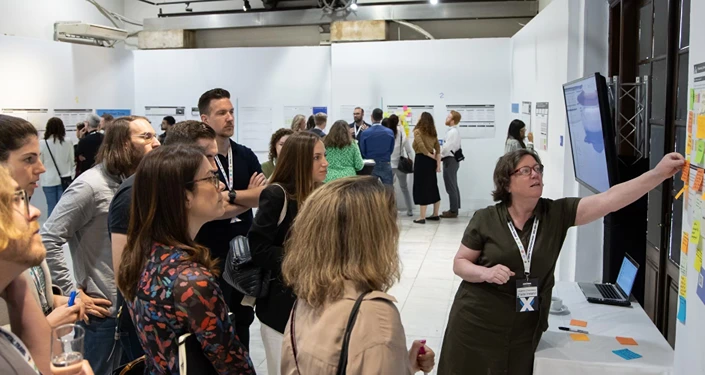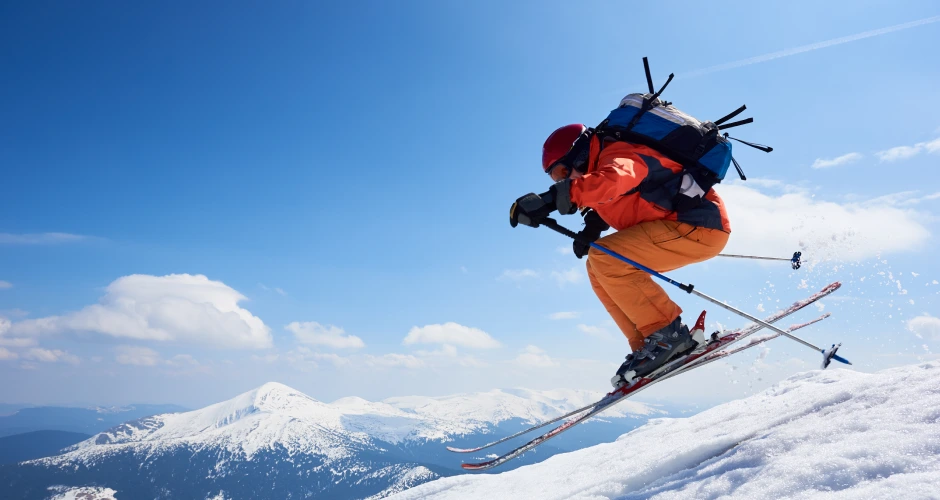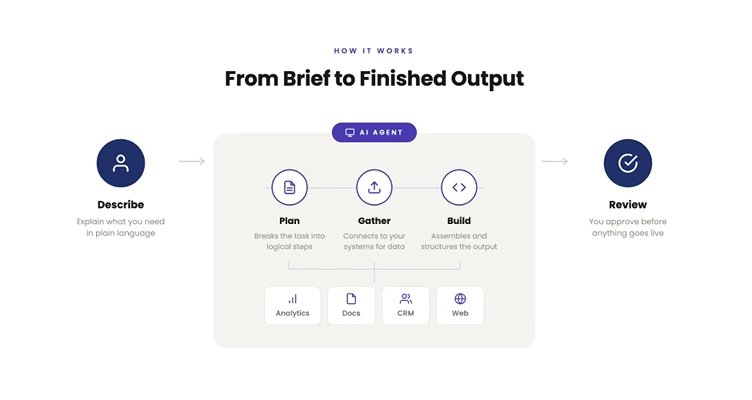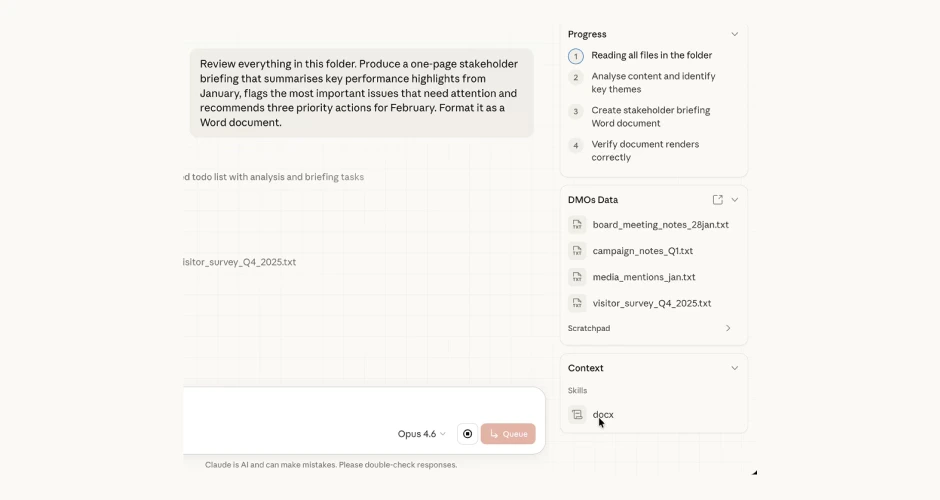In our Backstage Leadership Conversations podcast series, in collaboration with Abu Dhabi's Culture and Tourism Department, we explore the post-pandemic trends in business travel, focusing on key areas such as technology, impact, sustainability and recovery. Learn how Abu Dhabi is helping the MICE sector to thrive.
For this series, we went backstage at Abu Dhabi Business Events Week and had engaging discussions with a range of interesting leaders from across the sector to understand more about the shifts and trends they have witnessed in their work. We heard a range of different perspectives and talked about how everybody can collectively come together to reinforce Abu Dhabi's very competitive positioning and continue to help the MICE sector thrive as a more competitive, exciting and innovative industry as we come out of the pandemic.
Nick Hall
In the sixth episode, we dive into how business events impact the wider destination with Geneviève Leclerc, co-founder and CEO of the nonprofit organisation #MEET4IMPACT. It's a collective and collaborative project that has been designed with the vision of transforming the business events industry by generating movement to create a positive societal impact with its actors across the events sector. They train professionals and support organisations in defining, managing, measuring and communicating the societal impacts of their activities and events.
Geneviève has more than 25 years of global experience in congress management and strategic consultancy for associations and destinations. She works as a content curator, facilitator, speaker and trainer with the association meetings and business tourism industry and she's specialised in sustainability and societal impact practices. Geneviève is passionate about applying design thinking practices to accompany organisations through innovation.
Having worked in the industry for the last 25 years, Geneviève has been able to observe a lot of change. I wanted to dive into some of the challenges that evolution and transition has brought to the meetings and events sector and what she's noticed in particular throughout her career.
Geneviève Leclerc
I think 25 years ago we probably weren't really calling it an industry or maybe I was less aware of the power behind this industry. I think one of the changes, a change in myself in becoming aware that this was actually a billion-dollar industry that was very far reaching, that really cuts across all the other industries. We call it an industry, but it's actually multi-sectorial, we touch every other sector because everyone is meeting.
One of the major changes that obviously we're concerned about is the increase in the sustainability conscience of event organisers in the destination and more so now regarding holistic sustainability. We started talking about sustainability around events in about 2004/2005. There were some standards that were developed at that time and unfortunately, these standards were dropped around 2010 because these standards weren't really talking about the purpose of the industry. It was all about managing waste and managing similar aspects. So there was a loss of interest. It didn't become the tidal wave that we thought it was going to be.
In the last five years, it's really come back in strong force. We've seen a really acute conscience of what we produce and generate as waste and carbon as an industry, but more so how we also create value as an industry. The terms 'legacy', 'sustainability' and 'regeneration' have become very prevalent, even in the last two years.
Nick Hall
The word impact is one that has been used extensively over the last few years. It's something that Geneviève covered during her keynote at the Abu Dhabi Business Events Week in 2022, where she said it's often misunderstood despite its wide use. I decided to dive a little deeper into this with her.
Geneviève Leclerc
One of the things that I started doing five years ago, I left my job and became a consultant. I became interested in the social innovation scene, started doing classes and courses around social impact. This totally changed my outlook and has really influenced the way I work today.
Fundamentally, I thought about impact as a short-term thing. But I realised that might be good for boxing, but not for business strategy. When we start thinking about the impact of business strategies, policy changes or development strategies, we're really talking about long-term and sustained change that will create benefits at the population level or at the planet level.
We can see short-term effects and outcomes. However, to really claim that there is impact, we need to see a sustained change that transforms over time from a mere effect of someone having learned something new or wanting to do something, to actually implementing real behaviour change and new practices in organisations so that there is a long-term effect. For example, someone at the community level feels better and has better conditions, better status or the planet gets better.
Nick Hall
Having a clearer understanding of what impact is, I asked Geneviève how the events industry can work towards positively taking concrete action on the Sustainable Development Goals (SDGs) to tackle some of the global challenges we are seeing.
Geneviève Leclerc
When we talk about impact, we talk about managing our impact. This fundamentally means two different and parallel strategies. The first, which we are more used to is managing our negative impact, otherwise called our footprint. How can the events industry reduce its footprint on the planet? It's a fairly resource-heavy industry and generates a lot of waste, including carbon from flying.
We really need to get better at understanding how to reduce that negative impact. The SDGs give us a blueprint and give us a common language with governments, our clients and the association sector. This really zones in on the different categories of impacts that we should be managing and mitigating, as well as identifying targets that we should be looking forward to.
The other side of managing impact is managing positive impact. This means focusing on creating added value; not just mitigating the risk because we're creating damage, but creating positive value that is going to become a shared value for society. There are a number of SDGs that talk about this value. Education, for example, would be a goal where we would be looking to create added value. We're looking to create something new for society.
There are a lot of different tactical things that we can do. Nevertheless, the fundamental strategy that unites them all is to say that there should be a deliberate purpose to leverage each one of these events that we're hosting or that we're creating on our turf to create additional values for the set of stakeholders. Sometimes these stakeholders are the event participants, they could be the sector representatives anywhere in the world - someone in that field that would benefit from a development in the field - but they could also be the local community where having a lot of congresses generates tangible benefits.
I was actually just in a workshop with some stakeholders here in Abu Dhabi and we had proponents of two different congresses around the table. One of them was from the International Society for Physical Activity in Health, which is having their Congress here in October, and the others were from the World Environmental Education Congress, being held in 2024. Both of these events have very specific intentions to create value for the local community. For example, considering the physical education group, there is little physical activity in the Gulf countries. There are infrastructure barriers, cultural barriers and climate barriers. Who wants to go out and cycle in 40 degrees? There are some real challenges that they need to overcome to help people achieve a healthier level of physical activity. What the stakeholders around this congress are tackling is really how to change behaviours in the region to make sure that people are achieving better health outcomes. That's an amazing kind of congress legacy goal to be saying we're working towards population health outcomes.
Nick Hall
As I was talking with Geneviève, I reflected on how fascinating it is to think about the large number of people who are impacted by the event sector, including attendees, organisers and destinations attracting events through their vision and their sense of purpose. With this in mind, I asked Geneviève to share a little more about some of the initiatives that have really stood out to her over the years that she's been in the industry. I wanted to see if this might perhaps serve as a departure point to find new ideas that can help us address sustainability needs through creative approaches and bringing people together to focus on those.
Geneviève Leclerc
In general, congresses or events, through their own programming will deliver value, they'll deliver some kind of benefit. When we look at when a congress builds a wide-ranging ecosystem and starts creating parallel activities in the community, such as physical activities and global exhibitions where the public can be invited. For example, we work with the AIDS Congress this summer. The AIDS Congress put together a global village, which is a very large art exhibition that contains people's exhibits, with activists putting their exhibits there. It's also got conferences and has community organisation. This is free and open to the general public. Even people who don't have access to these congresses can go and interact with participants or activists from around the world to really take actionable takeaways. What we're hoping through having this in Montreal is to really raise the awareness of local activists, local participants as well as local patients and their families on how things are done elsewhere, and they get inspired.
We're working on a different event in Flanders, which is the International Association for Children in Museums. These people are working towards better education, more creativity and more inspiration for children by going to museums. They've connected with the city of Mechelen, which is a city that brands itself as a city for families. They've decided that what they wanted to do was to make museums more accessible, to increase the content in museums. We've even got kids engaged in creating content for museums. The city has a child mayor, they've got a child council. So we're seeing a number of initiatives to make sure that once this conference leaves, there's a lasting legacy in the city. They've raised the level of museum content and got more kids activated through museums and it becomes a place of learning, inspiration and discovery. It's a really fascinating event and there are lots of initiatives that will come out of this event. It's exciting to be working with people like this because they've got really concrete goals of what they want to do.
Nick Hall
To finish things off, as Geneviève was involved in a large number of sessions and interventions at Abu Dhabi's Business Events Week, I asked her to tell us a little bit more about some of those really brilliant discussions that she'd been involved with. What were some of the ideas that have emerged out of that and what has she seen that starts to put into motion some of the ambitions and targets that we've discussed a lot as an industry over the last couple of years? How does this give us some insights into the results that we've witnessed at the end of such an incredible event?
Geneviève Leclerc
I think overall, just reconnecting in the region. It's a strong region. They have a lot of assets for business events. There are also a lot of gaps. It's a new country. There are new cities. They realise that there's a need for external and internal expertise. I think one of the outcomes of the event in general is to really connect local expertise and international expertise and get the opportunity to raise the level that they're delivering here.
I also think they need to raise their profile. Obviously, we've got Dubai, we've got Abu Dhabi. There are two destinations that are very close by, with very different branding. Abu Dhabi is perceived more as a place of culture. There are a lot of medical institutions here. I think getting their brand out and making their distinctive quality stand out is important.
Out of the individual sessions I've been involved with, I've seen some direct outcomes because we were doing an impact workshop. Seeing the people around the room immediately identify things they could implement in their organisations and say, wow, this is amazing, we've been doing this intuitively, but now we have a framework.
The doctor that was in charge of the physical activity event that I was talking about a few minutes ago was sitting at the table with a representative of a very large conglomerate here that owns a number of venues on Yas Island, namely the Formula One track and all of the venues around them. They didn't know each other at the beginning of the workshop, and two hours later they had already formed a partnership, where the lady from the Yas Island company Miral was already proposing to host public physical activities and championships on her track in her venues during the congress. She pledged support to the doctor. So, within two hours there was a new partnership and a whole range of legacy activities being created on the spot in that room. That was amazing to see because they just rallied around a common vision. They immediately understood how they could help each other and that partnership is now going. As I walked out of the workshop, they said, you can say that the legacy of your workshop has already started. That's what we aim for and that's why we need these face-to-face events.
Nick Hall
During my conversation with Geneviève, she made a very convincing case for why face-to-face events are so important and valuable for destinations. We learnt how they bring about a real sense of change for destinations and the many communities that benefit either directly or indirectly from the sector.
I was also able to reflect on the massive impact that events have on destinations, something that the MICE sector should keep in mind to move forward and develop more sustainably looking towards the future. This includes considering the role that locals play in the bigger picture, thinking about the SDGs and our vision as destinations to find alignment between them.
Geneviève also pointed us to some very exciting ideas, which help us to reimagine what events might look like in the future. She explained how we can shape events to create and influence the positive impact that we want to achieve.
Key Takeaways
Sustainability consciousness in the events industry has evolved in recent years. In the past, there has been a focus on mitigating negative impacts, such as waste and carbon emissions. However, in the last 5 years, there has been a growing awareness of the need to create a positive impact, such as by promoting education. The SDGs provide a framework for event organisers to mitigate negative impacts and create positive impacts.
Here are some key takeaways from the conversation:
- Face-to-face events are essential for building relationships and creating a sense of community.
- Events can have a major impact on destinations, both economically and socially.
- Collaboration between different stakeholders in the events industry is essential for creating a sustainable and positive future for the sector.
- The fundamental strategy for all events is to create additional value for a diverse set of stakeholders through deliberate programming.
By leveraging each event to create additional value for a diverse set of stakeholders, event organisers can make a positive contribution to the planet and the population.






.svg)





.webp)










